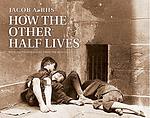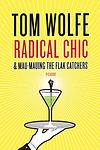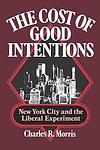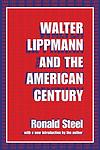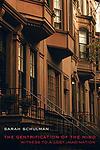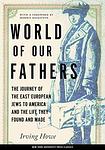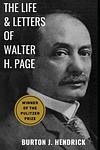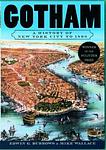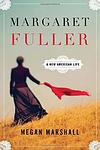The Greatest "New York City, American History" Books of All Time
Click to learn how this list is calculated.
This list represents a comprehensive and trusted collection of the greatest books. Developed through a specialized algorithm, it brings together 300 'best of' book lists to form a definitive guide to the world's most acclaimed books. For those interested in how these books are chosen, additional details can be found on the rankings page.
Genres
The "American History" category encompasses a broad range of books that delve into the events, figures, and forces that have shaped the United States from its pre-colonial days to the present. This genre includes works on pivotal moments such as the American Revolution, Civil War, and civil rights movements, as well as studies of political, social, and cultural developments across various eras. It covers biographies of influential leaders, analyses of policy changes, and examinations of societal shifts. Whether providing comprehensive overviews or focusing on specific incidents or decades, books in the American History category aim to illuminate the complexities of the nation's past, offering readers insights into the events that have defined the American experience and the context for its ongoing evolution.
Countries
Date Range
Reading Statistics
Click the button below to see how many of these books you've read!
Download
If you're interested in downloading this list as a CSV file for use in a spreadsheet application, you can easily do so by clicking the button below. Please note that to ensure a manageable file size and faster download, the CSV will include details for only the first 500 books.
Download-
1. The Death and Life of Great American Cities by Jane Jacobs
This book is a critique of 1950s urban planning policy, which it holds responsible for the decline of many city neighborhoods in the United States. The author argues that modernist urban planning rejects the city, because it rejects human beings living in a community characterized by layered complexity and seeming chaos. The book introduces groundbreaking ideas about how cities function, evolve and fail, providing a new perspective on the essentials of vibrant city life. The author also provides concrete examples of the unexpected consequences of urban renewal.
-
2. The Fire Next Time by James Baldwin
This book is a powerful exploration of race relations in America in the early 1960s. The author presents his experiences and observations in the form of two essays. The first is a letter to his 14-year-old nephew, discussing the role of race in American history. The second essay takes a broader look at the civil rights movement and the author's own experiences with religion and identity. Throughout, the author presents a passionate plea for the recognition of the humanity and dignity of all people, regardless of race.
-
3. The Warmth Of Other Suns by Isabel Wilkerson
"The Warmth of Other Suns" is a powerful and deeply moving narrative that chronicles the Great Migration, a significant event in American history that saw millions of African Americans leave the South in search of better opportunities and freedom from racial oppression. Through the compelling stories of three individuals, the book explores the challenges, triumphs, and sacrifices made by these courageous migrants as they embarked on a journey to find a new life in the North and West, ultimately reshaping the social and cultural landscape of America.
-
4. Up in the Old Hotel by Joseph Mitchell
"Up in the Old Hotel" is a collection of essays that paints a vivid picture of New York City from the 1930s to the 1960s. The stories introduce a rich tapestry of characters, from street preachers and gypsies to oystermen and bar regulars, each with their own unique history and perspective. The book captures the essence of the city and its inhabitants in a way that is both deeply personal and universally relatable, providing an intimate look at a bygone era.
-
5. How the Other Half Lives by Jacob A. Riis
The book is a detailed examination of the living conditions of the poor in New York City in the late 19th century. It provides a vivid and often shocking account of life in the slums, tenements and sweatshops of the city, based on the author's own investigative journalism. The book had a significant impact on public opinion and led to changes in housing laws and social policy.
-
6. Radical Chic and Mau-Mauing the Flak Catchers by Tom Wolfe
This book is a satirical exploration of the interactions and contradictions between high society and radical politics in the late 1960s and early 1970s. The first part of the book focuses on a fundraising party for the Black Panthers hosted by a wealthy New York couple, examining the complex mix of guilt, fascination, and patronizing attitudes among the elite guests. The second part of the book delves into the dynamics of racial tension and bureaucracy in San Francisco, revealing how marginalized groups learned to manipulate the system for their own benefit.
-
7. The Battle with the Slum by Jacob A. Riis
"The Battle with the Slum" is a historical documentation of the living conditions in the slums of New York City during the late 19th and early 20th century. The author, a social reformer and journalist, provides a detailed account of the overcrowded and unsanitary conditions that the city's poor were subjected to. The book also highlights the efforts of the government and philanthropists to improve these conditions and eradicate the slums, emphasizing the importance of housing reform and social welfare in urban development.
-
8. Ella Baker And The Black Freedom Movement by Barbara Ransby
This book is a comprehensive biography that chronicles the life and influence of a prominent civil rights activist who played a pivotal role in some of the most influential organizations of her time, including the NAACP, Martin Luther King Jr.'s Southern Christian Leadership Conference, and the Student Nonviolent Coordinating Committee. It delves into her commitment to grassroots organizing and participatory democracy, showcasing her belief in the power of the people to instigate social change. The narrative highlights her behind-the-scenes work, her emphasis on collective leadership, and her dedication to fighting racial and economic injustice, making a strong case for her as one of the most important, yet often overlooked, leaders of the civil rights movement.
-
9. Eleanor Roosevelt, Volume One: 1884-1933 by Blanche Wiesen Cook
This biography provides an intimate and detailed look into the life of one of the most influential women in American history, a former First Lady who redefined the role with her active participation in social causes. The book delves into her personal struggles, including a challenging marriage and the search for her own identity, as well as her public achievements in human rights, her work with the United Nations, and her tireless advocacy for the underprivileged. Drawing from a wealth of sources, the narrative paints a portrait of a woman whose strength, intelligence, and compassion left a lasting impact on the world stage.
-
10. The Masters Of Capital by John Moody
"The Masters of Capital" delves into the influential world of American financiers who played pivotal roles in shaping the economic landscape of the early 20th century. The book provides an insightful analysis of how these financial leaders, often referred to as "captains of industry," utilized their wealth and power to impact the development of key industries and influence government policies. Through detailed accounts of their business dealings and personal networks, the narrative explores the complexities of financial power and its far-reaching effects on the American economy and society.
-
11. The Cost Of Good Intentions by Charles R. Morris
"The Cost of Good Intentions" examines the fiscal crisis that New York City faced in the 1970s, tracing its origins back to the expansive welfare policies initiated in the 1960s. The book argues that these well-meaning social programs, designed to alleviate poverty and improve urban life, inadvertently set the stage for economic disaster by creating unsustainable financial obligations. Through detailed analysis, the narrative explores how the city's commitment to generous social services, coupled with inadequate fiscal management and broader economic challenges, led to a situation where New York nearly declared bankruptcy, highlighting the complex interplay between political ambitions and economic realities.
-
12. Malcolm X: A Life of Reinvention by Manning Marable
This biography provides an in-depth exploration of Malcolm X's life, from his early days of crime and imprisonment to his transformation into one of the most influential African-American leaders. It delves into his complex relationships, his evolving political beliefs, and his controversial views on race and religion. The book also examines his assassination, shedding new light on the circumstances around his death and the conspiracy theories that followed.
-
13. Walter Lippmann and the American Century by Ronald Steel
This book provides an in-depth look at the life and work of Walter Lippmann, one of the most influential journalists in American history. The author explores Lippmann's role in shaping 20th century American politics and public opinion, his relationships with key political figures, and his views on democracy, liberty, and international relations. The book also examines Lippmann's personal life, including his early years, education, and family life.
-
14. The Gentrification of the Mind by Sarah Schulman
"The Gentrification of the Mind" is a critical examination of the impact of the AIDS epidemic on American society and culture, particularly in relation to urban gentrification. The author argues that the loss of a generation of artists, writers, and thinkers due to the AIDS crisis led to a homogenization of culture and thought, similar to the way gentrification leads to a homogenization of urban neighborhoods. The book is a powerful critique of the erasure of diverse voices and experiences, and a call to remember and honor the lost history of those affected by the epidemic.
-
15. World Of Our Fathers by Irving Howe
"World of Our Fathers" delves into the migration, lives, and cultural integration of Eastern European Jews who moved to America, particularly New York City, around the turn of the 20th century. The book explores the challenges these immigrants faced, including poverty and assimilation, while also highlighting their contributions to American society and the rich cultural heritage they maintained. It examines the evolution of Jewish identity in the United States, the rise of labor movements, and the impact of socialism and secularism on Jewish life, providing a comprehensive historical and sociological analysis of this significant immigrant group.
-
16. Invisible Child: Poverty, Survival And Hope In An American City by Andrea Elliott
"Invisible Child" is a non-fiction book by journalist Andrea Elliott that tells the story of Dasani, a young girl living in poverty in New York City. The book follows Dasani and her family as they struggle to survive in a city that seems to have forgotten them. Despite the challenges they face, the family never loses hope, and their resilience and determination are a testament to the power of the human spirit. Through Dasani's story, Elliott sheds light on the systemic issues that perpetuate poverty in America and the urgent need for change.
-
17. Hip Hop Family Tree by Ed Piskor
This graphic novel chronicles the origins and evolution of hip hop culture, exploring its roots in the Bronx during the 1970s. Through vibrant illustrations and engaging storytelling, the book delves into the lives of influential figures like DJ Kool Herc, Grandmaster Flash, and Afrika Bambaataa, showcasing their contributions to the genre and their impact on music, art, and fashion. With meticulous attention to detail, "Hip Hop Family Tree" offers a captivating and comprehensive look at the birth of a cultural phenomenon.
-
18. Founding Brothers: The Revolutionary Generation by Joseph Ellis
The book provides an in-depth exploration of the American Revolution's aftermath, focusing on the lives of the founding fathers and the complex relationships between them. It delves into six key moments in early American history, including the duel between Aaron Burr and Alexander Hamilton, the secret dinner that determined the site of the nation's capital, George Washington's farewell address, John Adams's presidency, and the correspondence between Thomas Jefferson and Adams. The book emphasizes the crucial role of these individuals in shaping the nation's future and the profound impact of their decisions.
-
19. The Life and Letters of Walter H. Page by Burton J. Hendrick
This book provides an insightful biography of Walter H. Page, a prominent journalist and diplomat in the early 20th century. It is a compilation of his personal and professional correspondence, offering readers an intimate look into his life and thoughts. The book covers his early career in journalism, his role as the U.S. ambassador to the United Kingdom during World War I, and his passionate advocacy for education reform in the South. It also explores his relationships with influential figures of his time, providing a unique perspective on historical events and issues.
-
20. Gotham: A History of New York City by Edwin G. Burrows
"Gotham: A History of New York City" is an extensive historical account of New York City from its early establishment as a small Dutch trading post to its evolution into a bustling, world-renowned metropolis. The book explores the city's social, political, and economic transformation throughout the centuries, including its role in major historical events such as the Revolutionary War and the Civil Rights Movement. It also delves into the lives of its diverse inhabitants, from the Native Americans and European settlers to the waves of immigrants that have shaped the city's unique culture and identity.
-
21. Margaret Fuller: A New American Life by Megan Marshall
This biography explores the life of Margaret Fuller, a pioneering feminist, journalist, and women's rights advocate in the 19th century. The book traces her journey from her upbringing in Massachusetts, her role in the transcendentalist movement, her work as a foreign correspondent for the New York Tribune, to her tragic death in a shipwreck. The narrative provides an in-depth look at Fuller's personal struggles, her intellectual pursuits, and her groundbreaking achievements in a male-dominated society.
Reading Statistics
Click the button below to see how many of these books you've read!
Download
If you're interested in downloading this list as a CSV file for use in a spreadsheet application, you can easily do so by clicking the button below. Please note that to ensure a manageable file size and faster download, the CSV will include details for only the first 500 books.
Download



